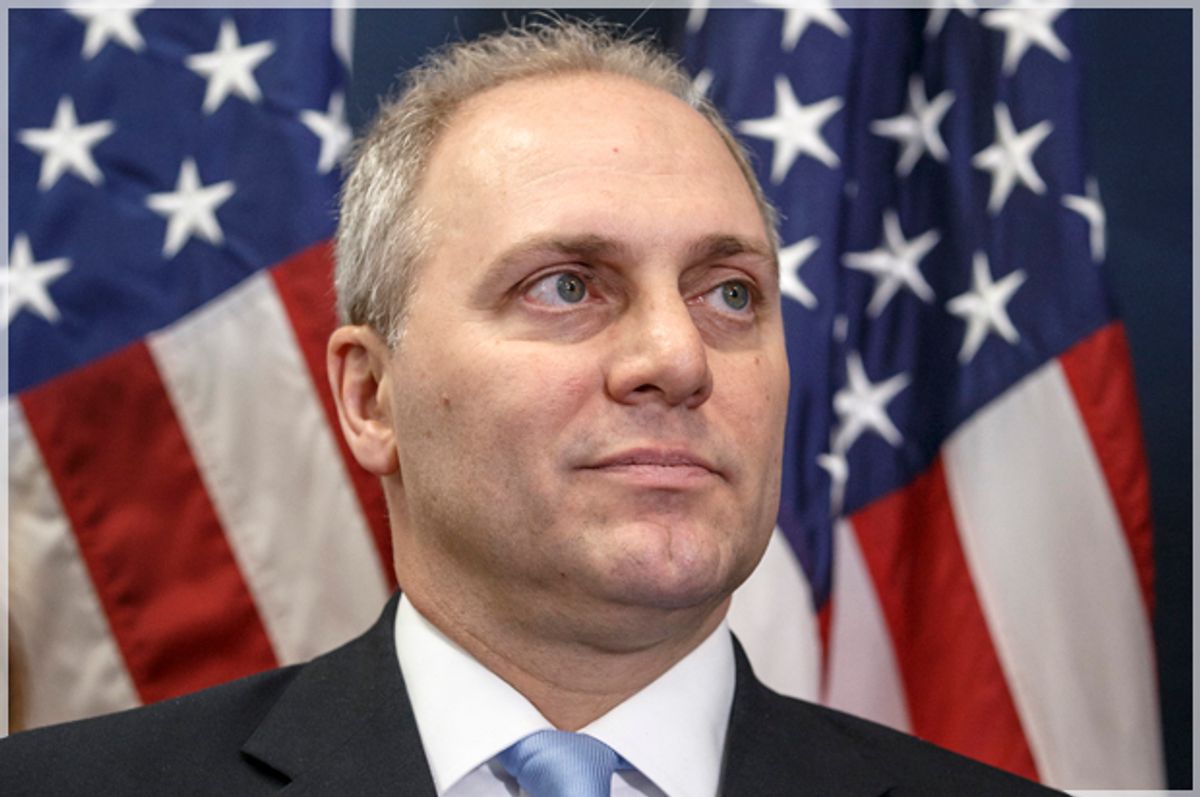I like to think of myself as a relatively savvy guy. I’ll even cop to the occasional bout of cynicism (I do write about American politics, after all). Still, I have to admit that, like my colleague Joan Walsh, I’m surprised to see Louisiana GOP Rep. Steve Scalise — recently exposed for courting literal white supremacists in 2002 — is not only still in Congress, but is still serving as the third-most-important member of the House GOP leadership team. Common decency aside, you’d think that the Republicans’ consuming desire to retake the White House in 2016 would be enough to compel them to kick someone so easily tied to former KKK Grand Wizard David Duke to the curb. But as Speaker John Boehner made clear this week, that’s not the case.
In fact, Boehner has not only refused to disown Scalise but has actually defended him, arguing that Scalise deserves mercy and understanding for his “mistake” rather than being stripped of power or suffering any further public rebuke. “I, like Mr. Scalise, served in the state legislature,” Boehner said on Wednesday, during the first press conference of the new Congress and the new year. “I remember my freshman term in the state legislature, when I had a half of a staffer,” the speaker continued. “You get asked to speak to a lot of groups,” he explained, “I think Mr. Scalise made it clear that he made an error in judgment. He spoke to a group, not clear who they actually were.” Who among us hasn’t accidentally mistaken a gathering of white supremacists for literally anything else, right?
Now, this may be my aforementioned cynicism kicking in, but my guess is that Boehner doesn’t really believe that a man who reportedly once described himself as “David Duke without the baggage” had no idea what he was doing when he spoke before an audience of David Duke fans. More likely is the explanation offered by Sahil Kapur of Talking Points Memo, that Boehner and his allies have determined the costs of Scalise’s dalliance with white power to be outweighed by the benefits of having him act as a liaison between leadership and the Tea Party. “[T]here was a desire for somebody from a solid red state in the top ranks of leadership,” one senior GOP aide told Kapur. Boehner and his second-in-command, Kevin McCarthy, are both Yankees, the aide explained. Scalise, on the other hand, is “able to talk to every member of [the GOP] conference.”
It may seem uncharitable of me to argue that Boehner more or less doesn’t consider associating with unreconstructed racists to be a fireable offense. And it would probably seem downright unfair of me if I claimed that Boehner sees pandering to Jim Crow nostalgists as a relatively minor discretion, on par with cursing out a waiter or cheating on a test. I’d agree — if not for the fact that that’s almost exactly what Boehner said on Wednesday to the press. “I know this man. I work with him,” one of the most powerful men in the world said of Mr. David Duke Without The Baggage. “I know what’s in his heart. He’s a decent, honest person who made a mistake.” As if Scalise’s critics were themselves guilty of sanctimony, Boehner added, “We’ve all made mistakes.”
Unfortunately, Boehner is hardly alone when it comes to seeing Scalise’s 2002 (not 1952 or 1962, mind you, but 2002) outreach to white supremacists as a case of poor judgment rather than a sign of unacceptable indifference. Rather than show any sign of understanding how anti-black racism is a cancer that’s been in the American body politic from essentially its beginning, one that won’t be contained or eradicated without constant vigilance, many GOPers have opted to follow Boehner’s lead, shifting the focus from maintaining the fledgling norm against white supremacy to interrogating Steve Scalise’s soul. Or anatomy: “Steve Scalise doesn’t have a racist bone in his body,” Wyoming GOP Sen. John Barrasso said recently on “Meet the Press.”
To be fair, Barrasso was endorsing a quote that originally came from Cedric Richmond, a state-level Louisiana representative and former Scalise colleague who is not only a Democrat but also African-American. And that phraseology was echoed by former Louisiana Gov. Edwin Edwards, who is also a Democrat. “I know Scalise, and I think he’s far too right, far too conservative, but I don’t think he’s a racist,” Edwards told Bloomberg’s Dave Weigel. “He doesn’t have a racist bone in his body,” he continued, before asserting that Scalise “is nothing at all like a racist.” We should keep in mind that Edwards is an elderly man and the product of an era when being a Democrat meant something much different than it does today; but nevertheless, it’s clear that Boehner’s formulation has purchase beyond the confines of the Republican Party and the far right.
So maybe Boehner and the rest of the GOP leadership’s decision to stick by Scalise isn’t actually as befuddling as I thought. Maybe it is, in fact, a quite logical outcome of a society that still refuses to fully confront and take responsibility for its racist past and the bigotry that permeates its most fundamental structures and institutions. Maybe the bitter truth is that so long as the American mainstream continues to view racism not as an independent force in our politics and culture — one that affects and preys on all of us, regardless of our ideology or race — but as a simple matter of political correctness, of minding our rhetorical Ps and Qs, folks like Scalise will be able to survive as long as they express contrition. And, of course, are regarded by the powerful as useful for some other purpose. Call me cynical, I guess.

Shares